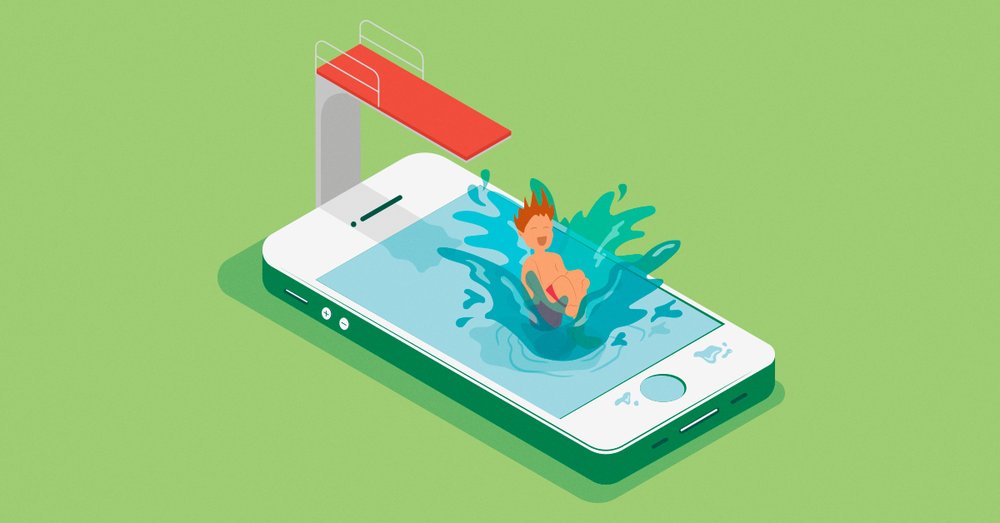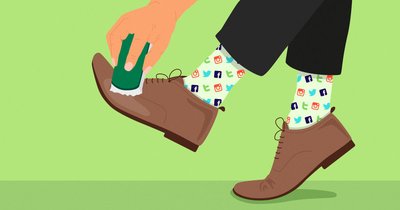Like most Kiwi businesses, we’re constantly thinking about the future: the risks, the opportunities, and the things we can do now to make things better tomorrow. You may have heard loads of talk about “digital disruption”, but it can be unclear as to what it all means.
Peter Fletcher-Dobson is Kiwibank’s Digital Advisor, a man who’s used to gazing into a crystal ball and trying to figure out what tomorrow holds. We sat down with him to see what change and disruption mean to Kiwi businesses like yours and ours.
Everyone’s talking about “digital” these days, but it seems to mean a whole bunch of different stuff.What do businesses talk about when they’re talking about “going digital”?
Peter Fletcher Dobson: Only a few years ago it was enough for organisations to have a digital strategy - this mainly focused on websites, mobile apps for self-service and sales, and then social media and digital marketing. But now as technology and the internet are advancing it’s not enough to think of “digital” as being something you do alongside your existing business. Businesses need to be looking to become digital businesses—not businesses who have digital channels. That is – using digital and data to reinvent customer products and services and, most importantly, how your organisation operates and thinks.
It can be hard to keep up with the trends of the digital world – what do you think are the big changes happening now, or just on the horizon?
PFD: In the recent past the key trends have been driven by the internet changing how we transfer information and content:
- Mobility – extending the internet to device such as Apple Watch or other mobile devices
- Cloud computing and APIs – being able to access information from the cloud, not dependant on a certain device, and APIs (Application Programming Interface) changing the way different systems ‘talk’ to each other. This is leading to more data sharing and creating new products and services.
These technology changes have fuelled the sharing economy and disrupted industries like music, news, publishing, TV, postal services, accommodation and taxi providers to name a few.
Now we’re seeing developments into: - Artificial Intelligence – exponential computing power combined with big data are creating machine learning that is already starting to outstrip human capabilities and growing at a fast rate.
- Internet of things– ordinary devices (appliances, vehicles, etc) being connected to the internet and being able to send and receive data.
- Digital trust– using Blockchain technology to be able to securely transact online without using trusted intermediaries (like banks, lawyers etc).
What this means for businesses is that in the next 10-20 years we are going to see more change than in the past 100. It is going to be like a new industrial revolution.
It’s exciting, but can seem daunting for business owners. How do you think this is affecting businesses?
PFD: There’s been a shift in company lifespan. Companies used to be around for decades before reaching a billion dollar valuation and felt comfortable with incremental growth rate of around 4-10%. New companies entering the market today are growing exponentially – and get there in a fraction of the time.
They are operating in a different environment – when it used to be important for a business to own all the assets that relate to their business operations, new businesses rent them. This speed and lower barriers to entry makes it hard for people to see the disruption coming. By the time you see it, it’s too late. For example, if you were a taxi company it would seem ridiculous that you could have a ‘taxi’ business without owning any taxis, but that is exactly what Uber has done. It’s a different business model for a different world.
There has also been a shift in mind-set of employees. People used to have a job for life, now the average person changes their job every two years. This can make it hard to hang on to staff, and retain the knowledge within the business.
So what are the top things a business owner needs to consider?
PFD: If you’re in a more traditional industry, be open-minded about the industry you’re in so you can understand the potential for disruption. For example, with the evolution of self-driving cars – if you think of yourself too much in the automotive industry you may miss the shift as this becomes software industry. It only took 15 years to knock over the news industry and see Facebook and Google – non media producers – take almost all the revenues.
The opportunity is to understand and leverage new technologies and marketplaces to focus on your customers and understand the value you provide and how their needs are being met. Customers won’t care what industry they’re shopping in, they’ll go with what best solves their needs. Before refrigeration there used to be ice cutters who would take ice from lakes and ship it to cities. It was a major industry until refrigeration technology was invented but not one ice-cutting and shipping company survived or even adopted the new technology. They forgot they were in the food preservation industry,not the ice-cutting and shipping industry. Their customer’s problem was better solved by having ice on demand, not having to order and wait for it.
Accept that there is always going to be change. You have to think about what is happening today and keep your business running. Focus at least 3% of your energy on what is coming – it is about optimising, evolving and reinventing at the same time.
Let’s end on a positive note - what is the thing that excites you the most about the changes in technology?
PFD: As digital disruption moves into sectors such as financial services, energy, farming, health and the barriers to entry are lowered the opportunities to create new value are unprecedented. Some examples are:
- Super computers are now able to diagnose and treat diseases with more accuracy than human doctors anywhere in the world
- we have the ability to create organic, pest-free local produce anywhere in the world – even in the most inhospitable locations
- solar is now the cheapest energy source and its unlimited supply means cheaper access to electricity for billions
- the data insight generated by a totally connected world promises unprecedented automation in transport, homes and of course business processes and services
- new technologies will give more control to consumers over their personal information and assets financial transactions using Blockchain technology will be instantaneous and in many cases free
All of this means the resources need to create businesses will be cheaper and more accessible than ever before – the only barrier will be ideas and creativity.



